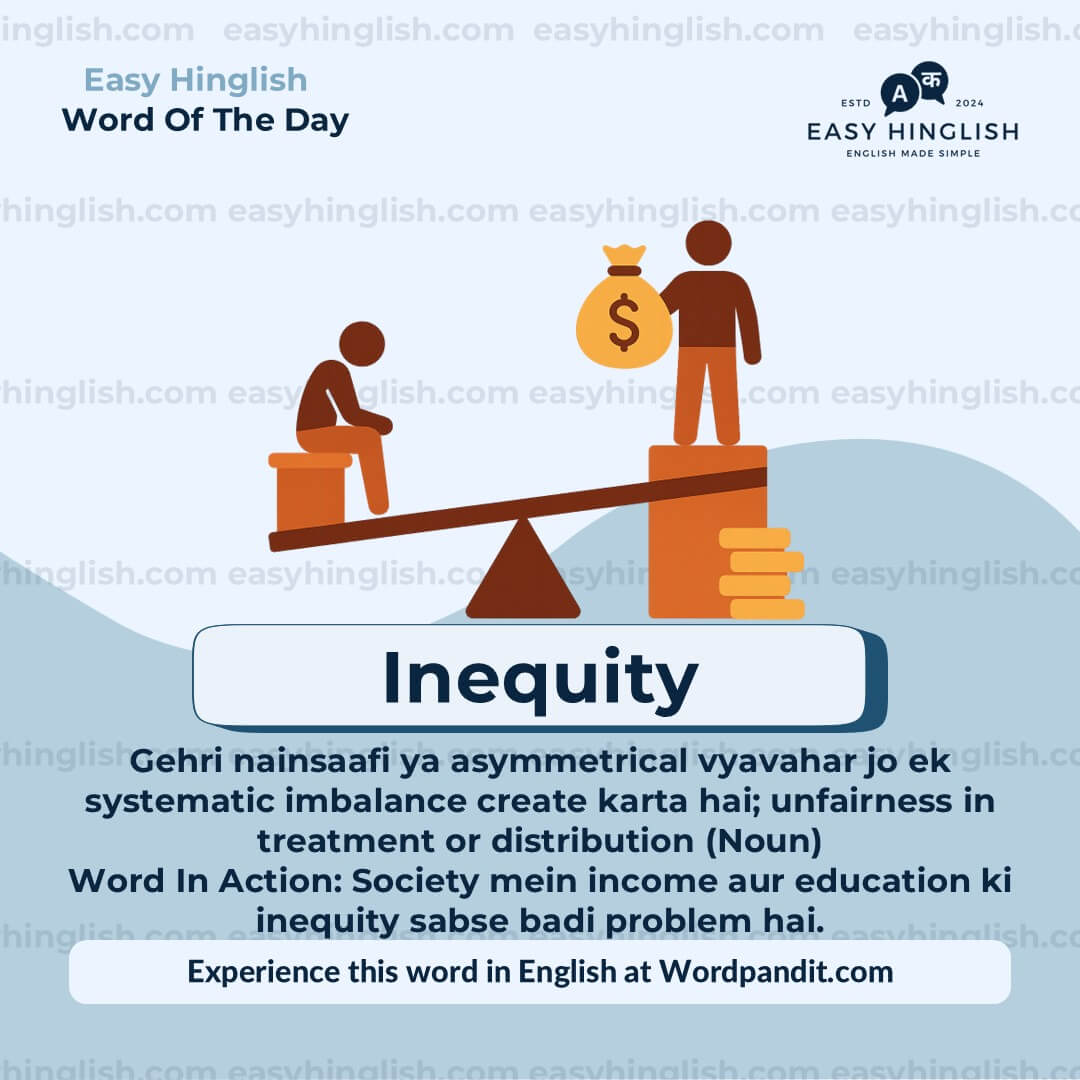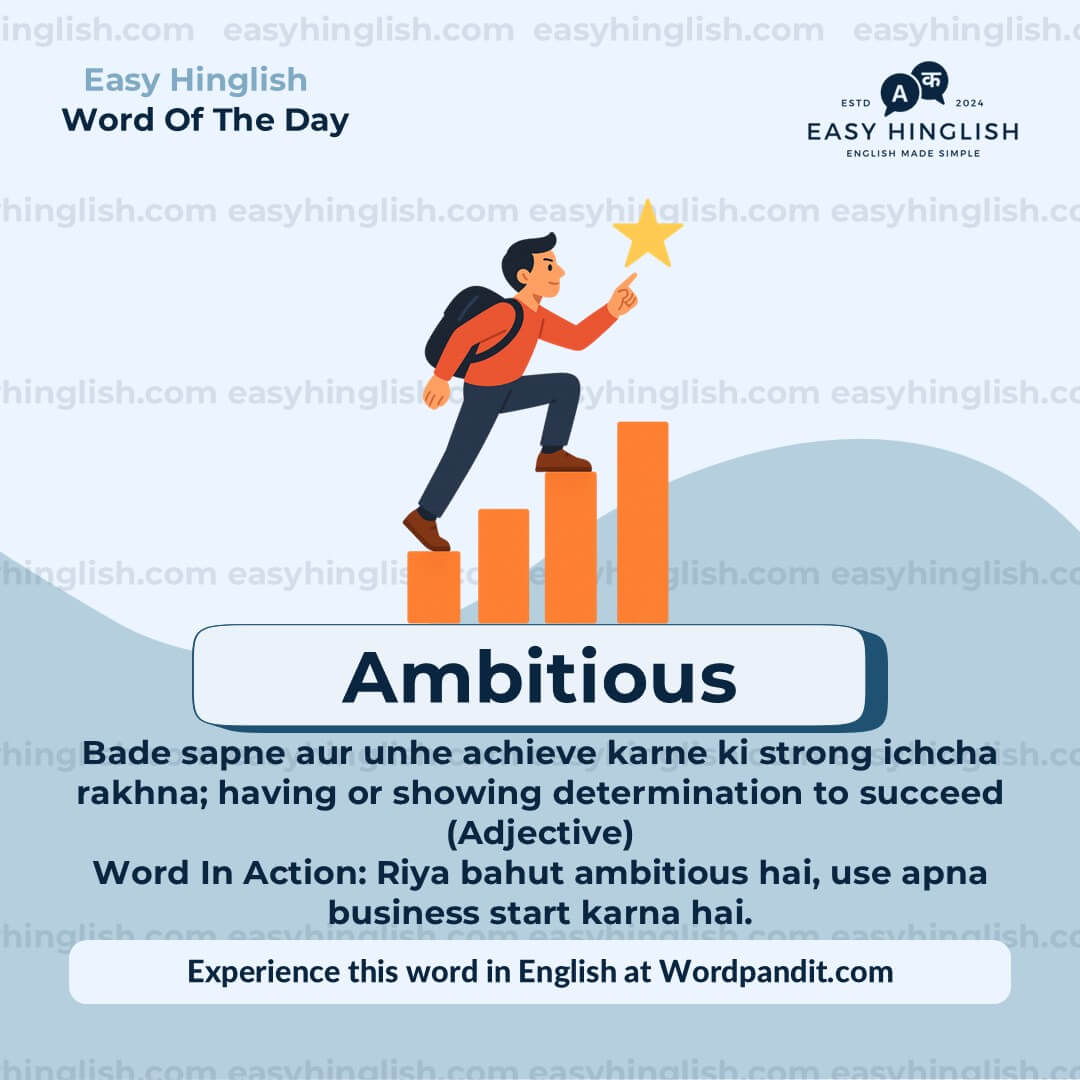Daily Vocabulary International Newspapers aur Publications se Seekho
Wordpandit ke Global Vocabulary Hub ke Saath Apni Vocabulary Expand Karo
Wordpandit par, hum aapko ek truly global vocabulary develop karne me madad karte hain, jo duniya ke sabse respected international publications se li gayi hoti hai. Yeh section aapko naye words se introduce karne ke liye design kiya gaya hai jo global conversations aur trends ko define karte hain.
Global Sources ka Power
Aapko globally sochne aur communicate karne me madad dene ke liye, hum vocabulary curate karte hain world ke top international sources se, jaise:
- The New York Times
- The Washington Post
- BBC
- The Guardian
- The Economist
- Scientific American
- Psychology Today
- Aur bhi bahut saare...
Globally Socho, Competitively Seekho
Hamare daily updates se aap international publications ke naye words seekhoge jo global news aur developments se jude hote hain. Isse aapki vocabulary current bhi rahegi aur globally relevant bhi.
Apni Global Soch Ko Expand Karo
Agar aap international exams ki tayari kar rahe ho, global business communication me excel karna chahte ho, ya sirf apni language skills improve karna chahte ho, toh Wordpandit aapko global level pe grow karne ke liye best resources provide karta hai.
Smart Learning, Global Reach
Hamari learning methodology me global examples, memory aids, aur interactive activities shamil hain, jo naye words ko effectively yaad karne aur real-world me use karne me madad karti hain.
Aaj Hi Apni Global Vocabulary Journey Shuru Karo!
Wordpandit Kyun Choose Karein?
Practical Learning: Aise words seekho jo real-world reading aur communication me aapko sach me kaam aayenge, taaki aapki comprehension aur bolne ki skills improve ho.
Diverse Content: Current affairs se lekar scientific breakthroughs tak, hamare different sources aapko multiple domains ki vocabulary seekhne ka moka dete hain.
Effortless Integration: Wordpandit ko apni daily routine ka part banao. Sirf kuch minute har din dene se aapki vocabulary time ke saath kaafi improve ho sakti hai.
Vocabulary Mastery Tak Ka Aapka Safar
- Regularly hamare Daily Vocabulary section ko visit karo
- Naye words explore karo aur unka context me use samjho
- In words ko apni writing aur bolne ki practice me use karne ki koshish karo
- Jaise-jaise aapke words badhte hain, apni progress ko track karo
Aaj Hi Apni Vocabulary Journey Shuru Karo!
Wordpandit ke saath vocabulary improve karna start karo. Roz thoda effort dalne se aap ek strong vocabulary develop kar sakte ho jo academic, professional, aur personal life me kaafi kaam aayegi.
Yaad rakho, ek naya shabd roz seekhna linguistic limitations ko door karne ka best tareeka hai! Wordpandit ko apni daily learning journey ka sathi banao aur vocabulary excellence ki taraf badho!
WORD-1: Inequity
Sandarbh (Context):
"A prelude to the inequity in recognition…" - The Indian Express
Vyakhya (Explanatory Paragraph):
Inequity ka matlab hai ek gehri nainsaafi ya imbalance jo kisi system ya treatment mein hoti hai. Yeh word tab use hota hai jab kisi ko unke deserve se kam mile ya resources aur opportunities ka distribution unfair ho. Inequity ka upyog formal writing, policy discussions, social commentary aur competitive exam passages mein karte hain jab systemic injustice ya structural unfairness ko highlight karna ho. CAT aur GRE ke RC passages mein yeh word aksar social issues, healthcare disparities ya economic imbalances discuss karte waqt dikhta hai.
Arth (Meaning): Gehri nainsaafi ya asymmetrical vyavahar jo ek systematic imbalance create karta hai; unfairness in treatment or distribution (Noun)
Uccharan (Pronunciation): in-EK-wi-tee (इनेक्विटी)
Kathinai Star (Difficulty Level): ⭐⭐⭐ Intermediate
Utpatti (Etymology): Inequity Latin word 'aequitas' se aaya hai jiska matlab hai 'fairness ya equality,' aur usmein 'in-' prefix add hua jo negation dikhata hai. Middle French 'inequite' ke through English mein aaya 16th century mein. Gradually, yeh word legal aur social contexts mein establish hua jahan structural unfairness aur systematic injustice ko describe karna zaroori tha.
Prashant Sir Ke Tathya (Prashant Sir's Notes):
Bahut students 'inequity' ko 'inequality' se confuse karte hain—dono mein subtle lekin important farak hai. Inequality simple measurement hai disparities ki (jaise income inequality), jabki inequity specifically unfair ya unjust inequality ko refer karta hai jo morally wrong ho. CAT aur UPSC ke students ke liye, inequity aksar social policy, healthcare access aur education system ke context mein dikhta hai. Indian newspapers mein aapko 'gender inequity in workplace' ya 'healthcare inequity in rural areas' jaise phrases milenge—yahan inequity signal karta hai ki yeh merely difference nahi balki ek systemic injustice hai jo address honi chahiye.
Samanarthi & Vipritarthi (Synonyms & Antonyms):
Samanarthi (Synonyms): unfairness, injustice, bias, discrimination, partiality, nainsaafi, imbalance, disparity (moral context mein)
Vipritarthi (Antonyms): equity, fairness, justice, impartiality, insaaf, balance
Udaharan (Usage Examples):
- Government report mein healthcare inequity expose hui—urban areas mein har 1000 logo par 2 doctors hain jabki rural areas mein sirf 0.3 doctors milte hain.
- Priya ne apne resignation letter mein salary inequity ka mudda uthaya kyunki usse kam experience wale male colleagues zyada earn kar rahe the.
- Educational inequity India ke tribal regions mein sabse zyada visible hai jahan quality schools aur trained teachers ki serious kami hai.
- Corporate promotion mein inequity tab dikhti hai jab deserving employees ko overlook kar diya jata hai aur connections wale log aage badh jaate hain.
Sanskritik Sandarbh (Cultural Reference):
"Jab tak inequity rahegi, samaj mein asantosh aur aandolan hote rahenge—history yahi sikhati hai." - Social reformer's perspective echoed in Indian political discourse
Sochiye (Think About It):
Kya har inequality automatically inequity ban jaati hai, ya phir kuch natural differences acceptable hain? Aur kon decide karta hai ki konsi disparity morally wrong hai aur konsi nahi?
Chhoti Kriya (Quick Activity):
Apne aas-paas ki ek inequity identify karein—school mein, office mein, ya society mein—aur do sentences mein explain karein ki woh kyun unfair hai aur usse kaise address kiya ja sakta hai.
Yaad Karne Ka Tarika (Memory Tip):
'Inequity' ko aise yaad rakhein: 'IN-EQUITY' matlab 'equity ke ANDAR nahi hai'—jahan equity (fairness) missing ho, wahan inequity (unfairness) exist karti hai. Ya phir socho: 'IN-equal + QUIT-y' = jab equality QUIT kar jaaye toh inequity aa jaati hai!
Vastavik Jeevan Me Upyog (Real-World Application):
Policy papers, social research articles aur editorial columns mein 'inequity' crucial term hai jab systemic injustice address karni ho. Corporate diversity reports mein iska use hota hai workplace disparities highlight karne ke liye, jabki healthcare aur education sectors mein yeh word access aur resource distribution ke structural problems identify karta hai. Competitive exam essays mein inequity word ka strategic use aapki analytical depth aur social awareness demonstrate karta hai.
WORD-2: Recognition
Sandarbh (Context):
"Time would, arguably, redress the balance, with TIME magazine ranking both among the 100 most influential people…" - The Indian Express
Vyakhya (Explanatory Paragraph):
Recognition ka matlab hai kisi ke kaam, talent ya achievement ko publicly acknowledge karna ya samman dena. Yeh word tab use hota hai jab kisi ko unke contributions ke liye credit mile, awards mile ya unki value ko formally accept kiya jaaye. Recognition ka upyog kaise karte hain—workplace discussions, award ceremonies, media coverage aur competitive exam passages mein jahan achievement aur appreciation ka context ho. CAT aur GRE ke reading comprehension mein yeh word aksar success stories, biographical passages ya organizational behavior topics mein dikhta hai.
Arth (Meaning): Kisi ke kaam ya yogdaan ko public taur par sweekar karna aur samman dena; acknowledgment of merit, service or achievement (Noun)
Uccharan (Pronunciation): rek-ug-NISH-un (रेकग्निशन)
Kathinai Star (Difficulty Level): ⭐⭐ Basic se Intermediate
Utpatti (Etymology): Recognition Latin word 'recognitio' se aaya hai jo 'recognoscere' se bana hai, jiska matlab hai 'know again' ya 'recall to mind.' Old French 'recognition' ke through 15th century mein English mein aaya. Pehle iska matlab tha simply 'identifying something familiar,' lekin gradually modern sense develop hua jahan acknowledgment of achievement aur formal appreciation ka concept add hua, especially professional aur social contexts mein.
Prashant Sir Ke Tathya (Prashant Sir's Notes):
Students aksar poochhte hain: recognition aur appreciation mein kya farak hai? Recognition formal aur public hota hai—awards, titles, official acknowledgment—jabki appreciation zyada personal aur informal ho sakta hai. UPSC aur CAT ke passages mein recognition aksar 'delayed recognition' ya 'lack of recognition' ke context mein dikhta hai, especially jab underrepresented groups, unsung heroes ya overlooked contributions ki baat hoti hai. Indian newspapers mein 'international recognition' phrase bohot common hai jab koi Indian artist, scientist ya athlete globally acknowledge ho. Recognition sentence mein typically 'receive recognition,' 'gain recognition,' ya 'deserve recognition' patterns follow karta hai—yeh collocations exam mein useful hain.
Samanarthi & Vipritarthi (Synonyms & Antonyms):
Samanarthi (Synonyms): acknowledgment, appreciation, credit, acceptance, acclaim, honor, samman, sweekar, praise, tribute
Vipritarthi (Antonyms): ignorance, neglect, rejection, disregard, andekhā, overlooking
Udaharan (Usage Examples):
- Dr. Ramanujan ko apne mathematical genius ke liye international recognition milne mein kai saal lag gaye, lekin eventually unka kaam world-changing mana gaya.
- Meera ne company mein paanch saal mehnat ki lekin proper recognition nahi mili, isliye usne better opportunity dhoondhne ka faisla kiya.
- Indian women scientists ko space research mein unka due recognition ab jaakar mil raha hai jab ISRO missions unki contributions highlight kar rahe hain.
- Social media ne local artists ko global recognition paane ka platform diya hai jo pehle sirf apne gaon tak limited the.
Sanskritik Sandarbh (Cultural Reference):
"Taare Zameen Par mein Ishaan ko recognition tab mili jab art teacher ne uski unique abilities ko dekha aur celebrate kiya—recognition sirf awards nahi, understanding bhi hoti hai." - Bollywood's perspective on acknowledgment
Sochiye (Think About It):
Kya recognition milna success ke liye zaroori hai, ya phir personal satisfaction hi kaafi hai? Aur agar recognition delayed ho ya kabhi mile hi nahi, toh kya kaam ki value kam ho jaati hai?
Chhoti Kriya (Quick Activity):
Apne life mein ek aisa person identify karein jisko proper recognition nahi mili hai—family member, colleague, ya local hero—aur ek paragraph likhein explaining kyun unhe recognition milni chahiye.
Yaad Karne Ka Tarika (Memory Tip):
'Recognition' ko aise yaad rakhein: 'RE-COGNITION' matlab 'dobara COGNITION (jaanna)'—jab aap kisi ko RE (phir se) recognize karte ho unke kaam ke liye. Ya phir connect karo cricket se: jab player 'Man of the Match' award paata hai, woh uski performance ka PUBLIC RECOGNITION hai!
Vastavik Jeevan Me Upyog (Real-World Application):
Corporate communications aur HR documents mein 'recognition' key term hai jab employee appreciation programs, awards ceremonies ya performance reviews ki baat hoti hai. Media articles mein iska use hota hai jab artists, scientists, athletes ya social workers ke achievements highlight karne ho. Academic writing aur research papers mein 'recognition of contributions' phrase standard hai. Business emails mein 'in recognition of your efforts' jaise phrases professional acknowledgment express karte hain, jo workplace communication mein important skill hai.
WORD-3: Ambitious
Sandarbh (Context):
"Governments are announcing ambitious plans and pledging huge resources." - The Indian Express
Vyakhya (Explanatory Paragraph):
Ambitious ka matlab hai badi aur challenging goals ke saath strong desire aur determination rakhna. Yeh word tab use hota hai jab koi person ya organization difficult targets set kare jo achieve karna mushkil ho lekin possible bhi ho. Ambitious ka upyog kaise karte hain—job interviews, project proposals, news articles aur competitive exam passages mein jahan aspiration, goals aur large-scale plans discuss ho rahe hon. CAT aur GRE ke business aur leadership passages mein yeh word commonly dikhta hai jab bold initiatives ya aggressive strategies describe ki jaati hain.
Arth (Meaning): Bade sapne aur unhe achieve karne ki strong ichcha rakhna; having or showing determination to succeed (Adjective)
Uccharan (Pronunciation): am-BISH-us (ऐम्बिशस)
Kathinai Star (Difficulty Level): ⭐⭐ Basic se Intermediate
Utpatti (Etymology): Ambitious Latin word 'ambitiosus' se aaya hai jo 'ambitio' se bana hai, jiska original matlab tha 'going around' ya 'canvassing for votes'—Roman politicians jo votes ke liye log-baag karte the. French 'ambitieux' ke through 14th century mein English mein aaya. Initially iska negative connotation tha—overly eager for power—lekin modern usage mein yeh largely positive ban gaya hai, representing healthy aspiration aur drive for success, though kabhi-kabhi excessive ambition ke liye bhi use hota hai.
Prashant Sir Ke Tathya (Prashant Sir's Notes):
Bahut students ambitious ko sirf 'determined' samajhte hain, lekin isme ek extra layer hai—scale aur scope ki. Ambitious plans wo hoti hain jo not just determined but also LARGE-SCALE aur CHALLENGING hoti hain. Ambitious aur aspiring mein kya farak hai? Aspiring zyada neutral hai aur simply desire dikhata hai, jabki ambitious mein intensity aur often risk-taking ka element hota hai. Indian newspapers mein 'ambitious project' aksar tab use hota hai jab government koi badi infrastructure ya policy initiative announce kare—jaise 'India's ambitious digital transformation' ya 'ambitious renewable energy targets.' CAT RC passages mein ambitious word signal karta hai ki plan bold hai lekin challenges bhi face karega, toh uske baad ka content obstacles ya feasibility discuss kar sakta hai.
Samanarthi & Vipritarthi (Synonyms & Antonyms):
Samanarthi (Synonyms): aspiring, determined, driven, enterprising, bold, aggressive (positive sense), motivated, goal-oriented, utsahi, udyami
Vipritarthi (Antonyms): unambitious, complacent, satisfied, apathetic, lazy, content, aalsi, santusht (negative sense)
Udaharan (Usage Examples):
- Startup founder Rajesh ne ek ambitious target rakha ki woh apni company ko teen saal mein unicorn bana dega, aur investors impressed ho gaye uske vision se.
- Government ka ambitious Smart Cities Mission implement karna mushkil ho raha hai kyunki funding aur execution mein kaafi gaps hain.
- Priya bahut ambitious student hai jo simultaneously CAT, UPSC aur GRE ki preparation kar rahi hai—risky but possible if planned well.
- Film director ne ek ambitious project announce kiya—200 crore budget wali historical epic jo five languages mein release hogi simultaneously.
Sanskritik Sandarbh (Cultural Reference):
"3 Idiots mein Rancho ka dialogue: 'Pursue excellence, success will follow'—yeh ambitious mindset ka perfect example hai jahan bade goals ho lekin focus quality par ho, shortcuts par nahi." - Bollywood wisdom on ambition
Sochiye (Think About It):
Kya ambitious hona hamesha positive hai, ya phir kabhi-kabhi over-ambition problems create kar sakta hai? Indian society mein ambitious logo ko appreciate kiya jaata hai ya unhe 'too aggressive' samjha jaata hai?
Chhoti Kriya (Quick Activity):
Apna ek ambitious goal likhein—career, education ya personal life se—aur explain karein ki woh ambitious kyun hai aur aap use realistically achieve kaise karenge. Do sentences enough hain.
Yaad Karne Ka Tarika (Memory Tip):
'Ambitious' ko aise yaad rakhein: 'AM-BIG-US' = mai (AM) badi (BIG) cheezein karna chahta hoon (US ke liye ya apne goals ke liye). Ya phir Virat Kohli ko socho—uska ambitious nature hi use best batsman banata hai, hamesha bigger targets chase karta hai!
Vastavik Jeevan Me Upyog (Real-World Application):
Business proposals aur project reports mein 'ambitious targets' phrase commonly use hota hai jab stakeholders ko impress karna ho. News analysis mein journalists 'ambitious plans' bolte hain jab government policies ya corporate strategies discuss karein jo large-scale transformation promise karein. Job interviews aur resumes mein 'ambitious professional' apne career goals aur drive demonstrate karta hai. Academic essays mein ambitious reforms, policies ya theories discuss karte waqt yeh word critical analysis add karta hai—showing ki plan bold hai lekin challenges bhi face karega.
WORD-4: Boon
Sandarbh (Context):
"Amazon and other online distributors can be both a boon and a bane." - Scroll
Vyakhya (Explanatory Paragraph):
Boon ka matlab hai koi cheez jo bahut helpful ya beneficial ho, jaise ek blessing ya vardaan. Yeh word tab use hota hai jab koi technology, policy, person ya situation significant positive impact create kare aur life easier ya better bana de. Boon ka upyog kaise karte hain—newspaper articles, policy discussions aur competitive exam passages mein jahan benefits aur positive outcomes highlight karne hon. CAT, GRE aur UPSC ke reading comprehension mein 'boon' aksar 'bane' ke saath paired dikhta hai jab balanced arguments present kiye jaate hain ki koi cheez both helpful aur harmful ho sakti hai.
Arth (Meaning): Koi helpful ya beneficial cheez jo life mein positive change laaye; a blessing or advantage (Noun)
Uccharan (Pronunciation): BOON (बून, rhymes with 'moon')
Kathinai Star (Difficulty Level): ⭐⭐ Basic se Intermediate
Utpatti (Etymology): Boon Old Norse word 'bón' se aaya hai jiska matlab tha 'prayer' ya 'request for a favor.' Medieval times mein English mein aaya jab iska sense tha 'a favor granted in response to a request'—especially divine favors ya royal grants. Gradually Hindi mein 'vardaan' concept se connect hua aur modern usage mein yeh simply 'something beneficial' ka matlab rakhta hai, without necessarily divine ya formal grant ka context. Interestingly, yeh word Indian English mein bahut comfortable hai kyunki 'vardaan' concept se culturally relatable hai.
Prashant Sir Ke Tathya (Prashant Sir's Notes):
Students jo Hindi medium se hain unke liye 'boon' ekdum familiar lagta hai kyunki yeh bilkul 'vardaan' jaisa hai—blessing ya beneficial gift. Boon aur blessing mein kya farak hai? Blessing zyada spiritual ya emotional hota hai, jabki boon practical benefits emphasize karta hai. 'Boon and bane' ek fixed phrase hai jo exam passages mein bahut common hai—yeh balanced argument signal karta hai jahan both sides discuss honge. Indian newspapers mein aapko regularly milega: 'mobile phones—a boon or bane?', 'social media—boon for connectivity, bane for privacy', 'monsoon—boon for farmers, bane for urban infrastructure.' CAT RC mein jab yeh phrase dikhe, expect karo ki passage advantages aur disadvantages dono cover karega, toh questions bhi balanced understanding check karenge.
Samanarthi & Vipritarthi (Synonyms & Antonyms):
Samanarthi (Synonyms): blessing, benefit, advantage, godsend, windfall, asset, vardaan, fayda, laabh, gift
Vipritarthi (Antonyms): bane, curse, disadvantage, burden, nuisance, abhishap, mushkil, problem
Udaharan (Usage Examples):
- Online education pandemic ke dauraan students ke liye ek boon sabit hui jab schools band the aur learning continue rakhni thi.
- UPI payment system India ke small business owners ke liye boon ban gaya hai—transactions fast aur transparent ho gaye hain without cash handling hassles.
- Monsoon rains farmers ke liye boon hain lekin Mumbai jaise cities ke liye har saal flooding ka crisis laate hain.
- Remote work option working mothers ke liye real boon hai kyunki woh career aur family dono balance kar sakti hain efficiently.
Sanskritik Sandarbh (Cultural Reference):
"Indian mythology mein 'vardaan' concept bahut common hai—Ravana ko Brahma se boon mila tha invincibility ka, lekin woh ultimately uski downfall ka reason bana. Yeh dikhata hai ki har boon situational hai." - Mythological wisdom on blessings
Sochiye (Think About It):
Kya koi cheez pure boon ho sakti hai bina kisi negative side-effect ke, ya phir har advancement kuch trade-offs laati hai? Technology, medicine, ya social changes—kya sab 'boon and bane' dono hain?
Chhoti Kriya (Quick Activity):
Ek recent technology ya innovation choose karein—jaise AI, electric vehicles, ya social media—aur do sentences mein explain karein ki woh kaise simultaneously boon aur bane dono hai different perspectives se.
Yaad Karne Ka Tarika (Memory Tip):
'Boon' ko yaad rakhna super easy hai kyunki yeh Hindi word 'vardaan' se directly connect hota hai—both mean blessing ya helpful gift. Ya phir aise socho: BOON sounds like MOON—jaise MOON raat mein light deta hai aur helpful hai, waise hi BOON koi helpful cheez hai jo life brighten kare!
Vastavik Jeevan Me Upyog (Real-World Application):
Editorial articles aur opinion pieces mein 'boon' commonly use hota hai jab new technologies, policies ya social changes ke benefits discuss karni hon. Essay writing mein 'boon and bane' structure perfect hai balanced arguments present karne ke liye—especially topics jaise 'Internet—boon or bane?', 'Globalization ki impact', ya 'Modern technology ka role.' Business reports mein market opportunities ko 'boon for growth' describe karte hain. News headlines mein catchy phrases jaise 'Artificial Intelligence: Boon for Innovation or Bane for Employment?' reader attention grab karte hain aur complex issues ko relatable banate hain.
WORD-5: Robust
Sandarbh (Context):
"The publishing industry in India is fairly robust (if insular)." - Scroll
Vyakhya (Explanatory Paragraph):
Robust ka matlab hai strong, healthy aur resilient—jo challenges ya pressure ke bawajood stable aur effective rahe. Yeh word tab use hota hai jab koi system, industry, person ya structure durable ho aur easily break na ho. Robust ka upyog kaise karte hain—business reports, technical documentation, economic analysis aur competitive exam passages mein jahan strength, durability aur resilience describe karni ho. CAT aur GRE ke passages mein robust aksar economy, systems, health, arguments ya methodologies ke context mein dikhta hai, indicating strong fundamentals aur sustainability.
Arth (Meaning): Mazboot aur swasth; jo pressure ya challenges handle kar sake; strong, healthy and resilient (Adjective)
Uccharan (Pronunciation): roh-BUST (रोबस्ट)
Kathinai Star (Difficulty Level): ⭐⭐⭐ Intermediate
Utpatti (Etymology): Robust Latin word 'robustus' se aaya hai jo 'robur' se bana hai, jiska matlab tha 'oak tree' ya 'strength'—oak tree apni hardness aur durability ke liye famous hai. 16th century mein French 'robuste' ke through English mein aaya. Initially iska use physical strength describe karne ke liye hota tha—strong body ya hardy constitution. Gradually iska metaphorical use expand hua aur modern usage mein yeh systems, economies, arguments, methods sab kuch describe karta hai jo fundamentally strong aur resilient hon. Tech industry mein 'robust system' ka matlab hai failure-resistant aur reliable.
Prashant Sir Ke Tathya (Prashant Sir's Notes):
Bahut students robust ko simply 'strong' translate kar dete hain, lekin isme extra depth hai—resilience aur ability to withstand challenges. Robust aur strong mein kya farak hai? Strong simple power ya force dikhata hai, jabki robust mein durability aur sustained performance ka element hota hai. CAT aur GRE passages mein 'robust economy' ka matlab hai jo recession ya shocks ke baad bhi recover kar le, 'robust argument' ka matlab hai jo counter-arguments withstand kar sake, aur 'robust health' ka matlab hai overall fitness aur immunity. Indian business news mein aapko milega: 'India's robust GDP growth,' 'robust domestic consumption,' 'robust IT sector'—yahan robust signal karta hai ki fundamentals strong hain aur temporary setbacks se recover kar sakta hai. Technical writing mein 'robust methodology' ya 'robust framework' scientific rigor aur reliability indicate karta hai.
Samanarthi & Vipritarthi (Synonyms & Antonyms):
Samanarthi (Synonyms): strong, sturdy, resilient, durable, hardy, vigorous, sound, healthy, mazboot, tandurust, saakht
Vipritarthi (Antonyms): weak, fragile, delicate, frail, feeble, vulnerable, kamzor, nazuk, kachcha
Udaharan (Usage Examples):
- India's pharmaceutical industry itni robust hai ki pandemic ke dauraan poori duniya ko vaccines supply kar paayi despite domestic demand.
- Startup ka business model robust hona chahiye taaki market fluctuations ya competition se easily collapse na ho jaye.
- Grandmother ki 85 saal ki age mein bhi robust health hai—daily yoga aur simple diet unka secret hai.
- Professor ne kaha ki tumhara research methodology robust nahi hai kyunki sample size chota hai aur bias control nahi kiya gaya.
Sanskritik Sandarbh (Cultural Reference):
"MS Dhoni ki captaincy ko 'robust leadership' kaha jaata hai—chahe pressure kitna bhi ho, unka decision-making calm aur effective rehta tha, team ko stability deta tha." - Cricket commentary on resilient leadership
Sochiye (Think About It):
Kya hamesha robust hona zaroori hai, ya phir kabhi-kabhi flexibility aur adaptability zyada important hoti hai? Rigid strength aur resilient strength mein kya difference hai?
Chhoti Kriya (Quick Activity):
Apne daily life se ek example socho—system, person, organization—jo truly robust hai aur explain karo ki woh challenging situations mein kaise stability maintain karta hai. Do sentences likhein.
Yaad Karne Ka Tarika (Memory Tip):
'Robust' ko yaad rakhein aise: 'ROBO-BUST' = imagine karo ek ROBOT jo bahut STRONG (BUST matlab chest, strength) hai aur kisi bhi challenge ko handle kar sakta hai without breaking. Ya phir 'RO-BUST' = ROpe jitna STRONG (BUST), jo tanav mein bhi nahi tootta!
Vastavik Jeevan Me Upyog (Real-World Application):
Business presentations aur annual reports mein 'robust performance,' 'robust growth,' aur 'robust financials' phrases stakeholders ko assurance dete hain ki company fundamentally strong hai. Technical documentation mein 'robust system architecture' ya 'robust security framework' reliability aur fault-tolerance indicate karta hai. Economic analyses mein 'robust recovery' ya 'robust indicators' positive trends aur sustainable growth signal karte hain. Academic writing mein 'robust evidence' ya 'robust statistical analysis' research quality aur credibility demonstrate karta hai. Job interviews mein 'robust problem-solving skills' apni capability aur resilience showcase karne ka professional way hai.













